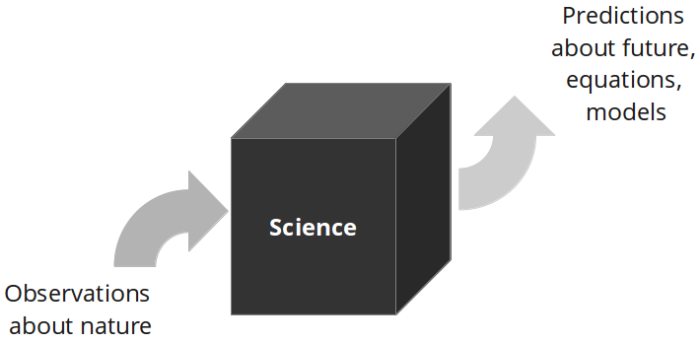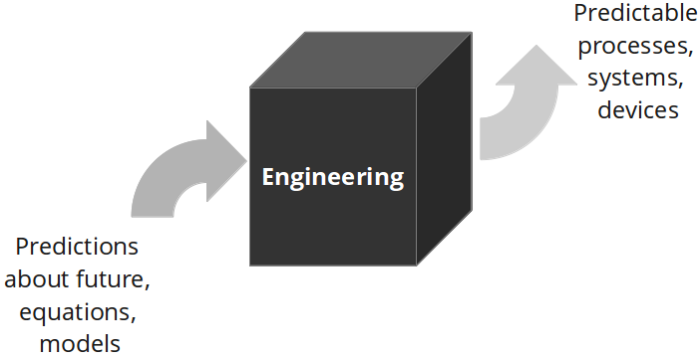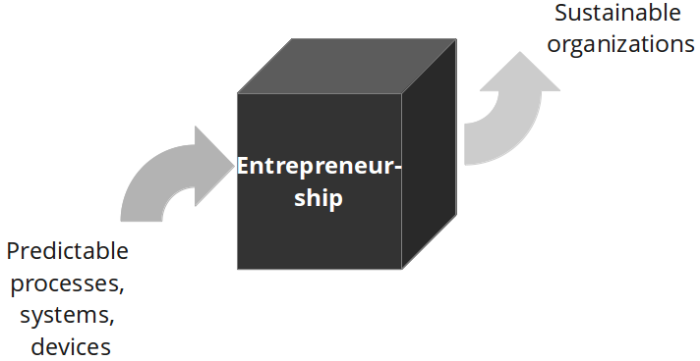My scientific and engineering view of coaching and teaching leadership
Science is the study of nature, looking for patterns, to predict results.
For the moment I’m not approaching leadership with the institutional view of science with researchers applying for grants from the National Science Foundation to do double-blind controlled experiments for peer-reviewed publication, though I’ve had a few graduate students approach me to do research like that.
Here’s a simpler view: science turns observations about nature into models and predictions about the future.

Science turns observations about nature into equations, models, and predictions about the future.
It’s simplified, but I think captures an important part of science. Thousands of years ago people noticed that what went up came back down. That’s an observation about nature that worked for most purposes. Science turned that observation into Newton’s laws of gravity, which was a specific model of nature. The process has happened in many other fields, including gravity after Newton.
What does this have to do with coaching and teaching leadership? A teacher believes that coaching and teaching will result in someone else behaving as they predict. The common view of leadership is that you can’t teach it—people think you’re born with it, that learning it requires life experiences you can’t predict, that what you aren’t born but can learn is still limited, and such.
I believe otherwise. I model my coaching and teaching on a model that you can coach and teach leadership experientially, based on models for teaching other disciplines. Random life experiences can augment training experiences, but aren’t necessary.
Today we have music schools, acting schools, sports clinics, and so on that teach disciplines. Not everyone who attends succeeds and everyone’s unique style results in unique outcomes, but we can predict that many students who attend and do the exercises will finish with skill in their field as a musician, actor, athlete, and so on. We don’t have such schools for leadership yet.
While coaching and teaching leadership, I’ve developed models that predictably led people to improve their leadership skills. I consider creating such models part of the scientific process. Practice and experiment will help refine the models and improve how we teach leaderships.
When you reach the stage of refining models and using them, not discovering new models, I consider you having moved into engineering.
Here’s a simple view: engineering turns the output of science into predictable processes, systems, and devices.

Engineering turns equations, models, and predictions about the future into predictable processes, systems, and devices.
Newton’s law of gravity plus engineering led to things like flying, rocketry, and things like that. I expect that experience with effective models for teaching leadership will move us to being able to engineer teaching leadership—that is, we’ll be able to teach people to lead like we teach people other subjects predictably. I think of my practice of coaching and teaching leadership in this stage.
Engineers make it possible to do things over and over. Here’s a simple view: entrepreneurship turns the output of engineers into sustainable organizations.

Entrepreneurship turns predictable processes, systems, and devices into sustainable organizations.
Once we’ve engineered coaching and teaching leadership enough, entrepreneurs like me will create schools to teach leadership specifically, where students can expect to learn to lead comprehensively. So far there aren’t any, at least no major ones I know of.
So that’s part of my dream for coaching and teaching leadership.
Read my weekly newsletter

On initiative, leadership, the environment, and burpees